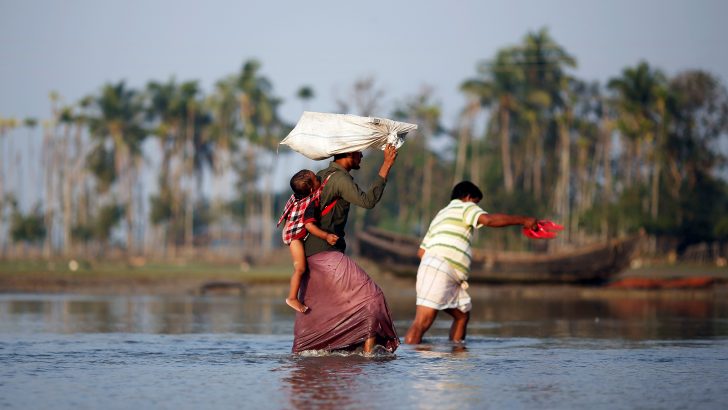As the plight of the Rohingya Muslims in Myanmar (Burma) worsens Catholic aid workers are helping hundreds of thousands of vulnerable people escaping deadly violence.
Bangladesh is bracing for a massive humanitarian crisis because of a lack of food, sanitation, medicines and even basic housing following the exodus of as many as 350,000 Rohingya into the country. At least 1,000 Rohingya have been killed in just two weeks.
The border between Myanmar’s Rakhine State and Bangladesh has become swollen with refugees who have set up makeshift camps with bamboos and polythene sheets to brave monsoon rains. Many are women, children and old people who face an uncertain future without citizenship of any nation or even bare essentials.
Generous
Some aid groups and generous local people have sporadically provided relief materials to refugees on the Bangladesh side of the border; while in Myanmar, aid has been stopped by the government.
Aid trucks arriving at the makeshift camps quickly ran out of food as thousands of hungry people enveloped them when they stopped.
In Chittagong, Bangladesh, James Gomes, regional director of Caritas, the Church’s charitable agency said: “The situation is so pathetic – people living under an open sky, without food, clothes and medicines, getting wet in the rain.”
He predicted an epidemic due to unhealthy conditions if people did not get help soon.
Caritas is planning to distribute food and other essentials to the Rohingya and will begin delivering it once donors secure necessary funds.
The UN Refugee Agency reports at least 300,000 Rohingya Muslims entered Bangladesh within two weeks of a military crackdown in Myanmar’s northern Rakhine state, triggered by an August 25 Rohingya militant attack on security checkpoints.
Abdul Wahab, 30, reached Bangladesh with his five-member family this week following a seven-day journey. He now resides in a roadside camp in Ukhiya.
“I cannot remember when we ate last in Myanmar before entering Bangladesh. We received some parched rice and molasses from a food truck,” Wahab told ucanews.com on Tuesday.
He said military had bombed their village using a helicopter and their home was destroyed.
“My five-year-old daughter had a nosebleed due to smoke from bombing; she is still sick and she needs medical support. We need a place to live and food for survival,” he added.


 Chai Brady
Chai Brady A Rohingya refugee carries his son and belongings into Teknaf, Bangladesh, Oct. 25. The majority of the 600,000 refugees fleeing a military crackdown in Myanmar over the past two months have gone to Bangladesh, but some have traveled into India and Nepal. Photo: CNS
A Rohingya refugee carries his son and belongings into Teknaf, Bangladesh, Oct. 25. The majority of the 600,000 refugees fleeing a military crackdown in Myanmar over the past two months have gone to Bangladesh, but some have traveled into India and Nepal. Photo: CNS